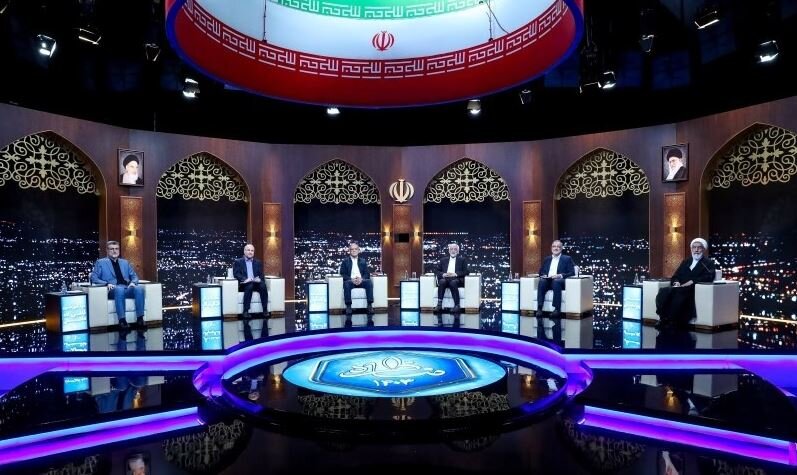TEHRAN – Six presidential candidates took part in their first televised debate on Monday, competing for the votes of viewers eager for the candidate who fits their vision for Iran's future.
The debate was the first of five scheduled over nine days, as the presidential candidates faced off for the first time and shared their policies and plans for Iran's economy ahead of the June 28 vote.
The debate was seen as disappointing by some viewers, who believed the length of the televised debate was the reason the candidates failed to capture voters' attention: more than six hours passed between the time the six candidates arrived at IRIB headquarters and the time they finished presenting their cases.
We fight less than before, but we still fight
Television presidential debates first aired in 2009, and since then several politicians who appeared on the show have been accused of unethical behavior and unfair attacks on their opponents.
Despite the relatively calm atmosphere at Monday's debate compared to previous years, some candidates were criticized for prioritizing attacking their opponents over promoting their own policies, including conservative candidate Alireza Zakhani, who spent a great deal of time trying to undermine reformist candidate Massoud Pezechkian.
Among the candidates, Amir Hossein Ghazizadeh Hashemi was praised for his calm and professional demeanor, while the candidate who made the biggest impression on viewers was Mostafa Pourmohammadi, who is less familiar to the Iranian public.
Pourmohammadi urged authorities to believe in Iran's capabilities while seeking to learn from past mistakes. His comments on Iranian banking practices, sanctions and corruption were also well received by the audience.
Pezzekian, Said Djalili and Mohammad Bagher Qalibaf, who were seen as the leading candidates in the elections, were criticized for repeating elementary facts and topics that had already been discussed.
New opinion polls show that the three candidates are not gaining significant support, but Pourmohammadi has emerged as a more visible figure in the presidential race and is garnering attention from voters.
Foreign Minister Zarif returns after three years in hiding
Pezeshkian on Tuesday sought to bolster his campaign for support by inviting former Iranian Foreign Minister Mohammad Javad Zarif as an adviser to a political debate on state television.
Zarif rose to prominence during his tenure as Iran's top diplomat when he helped Iran sign the Joint Comprehensive Plan of Action (JCPOA) with the 5+1 countries in 2015. He gained immense popularity by forging relatively good relations with the West after years of tension and lifting sanctions against Iran.
However, his popularity did not last long as former US President Donald Trump withdrew from the nuclear deal in 2018 and reimposed harsh sanctions on Iran under a “maximum pressure campaign.” European countries that signed the nuclear deal also failed to live up to their commitments. Since the JCPOA effectively collapsed, Foreign Minister Zarif has been criticized for compromising Iran's nuclear achievements and signing the agreement with Western countries without any solid guarantees.
During a television appearance, Zarif defended the signing of the JCPOA, saying President Trump's withdrawal from the nuclear deal did not mean the agreement was inherently wrong.
“President Trump also withdrew from the Paris Agreement on climate change mitigation and the INF Treaty with Russia. So those were bad deals?” he argued.
Appointing the former foreign minister as an adviser to Pezeshkian is seen as a good strategic political move, but it is unclear how it will affect the candidate's vote totals.
Mona Hojat Ansari

